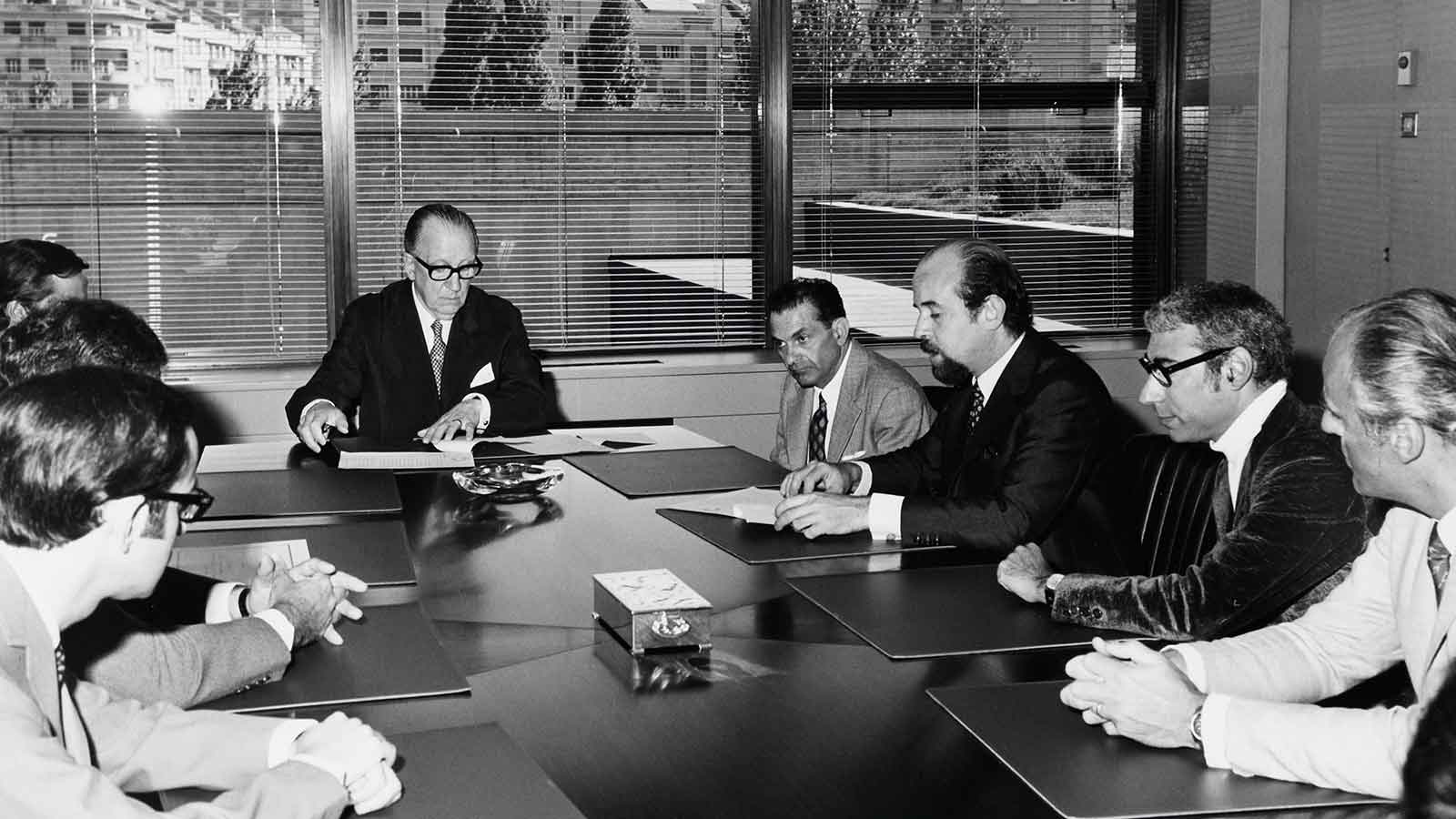Week of Studies on the New Portuguese Cinema, 1967
In September 1967, the Clube Português de Cinematografia – Cineclube of Oporto applied to the Fine Arts Department of the Calouste Gulbenkian Foundation for a subsidy for the organisation of the Week of Studies on the New Portuguese Cinema, to be held in Oporto in December of that year.
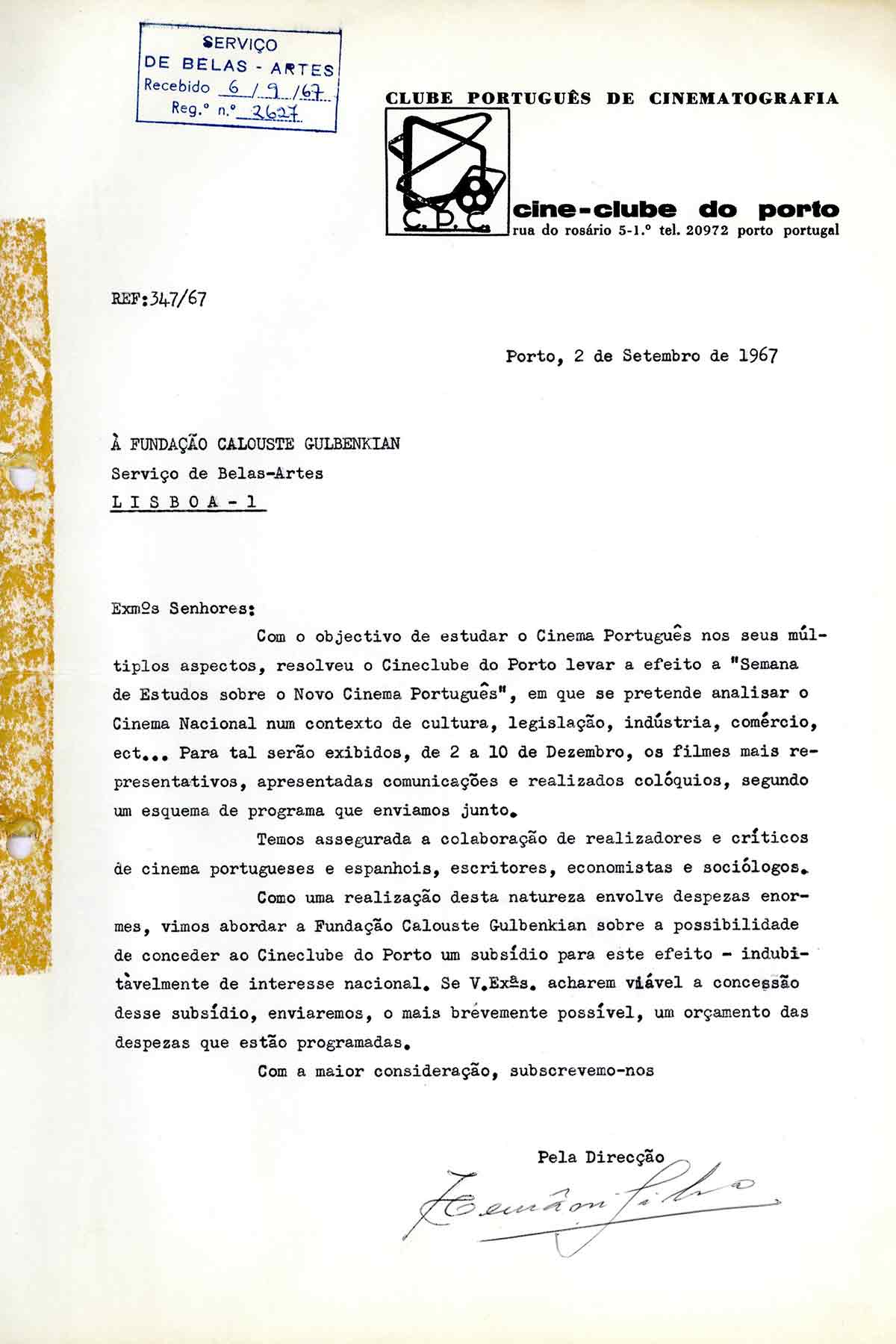
Carlos Wallenstein, who is responsible for the Theatre sector, suggested that Azeredo Perdigão support the initiative, arguing that “with a large number of people connected to the cinema taking part in this event, who are meeting to deal with a problem that the Foundation is also facing, this subsidy will give an indication of the Foundation’s interest in the subject to those people and even to the press, who criticise the Foundation for not helping the cinema”.
It is agreed to grant a subsidy of 50,000$00 for the realisation of the initiative and it is decided to send an observer.
Carlos Wallenstein suggests to the organizers that they dedicate “one of the colloquium sessions, in which there is a considerable representation of Portuguese filmmakers, to the consideration of how desirable it would be, from the point of view of cinema and of the artists who dedicate themselves to it, that the Foundation intervenes”.
This suggestion, which came from Artur Nobre de Gusmão, director of the Fine Arts Department, is welcomed by the organization, which proposes a round-table discussion “Portuguese cinema and the Calouste Gulbenkian Foundation – Future Possibilities for Portuguese cinema”, to which the “most apt and interested” Portuguese filmmakers are invited.
The Week of Studies on the New Portuguese Cinema takes place between December 2 and 10, 1967, with the financial support of the Calouste Gulbenkian Foundation and the Oporto City Council, in addition to the funds obtained from an auction of Contemporary Portuguese Art.
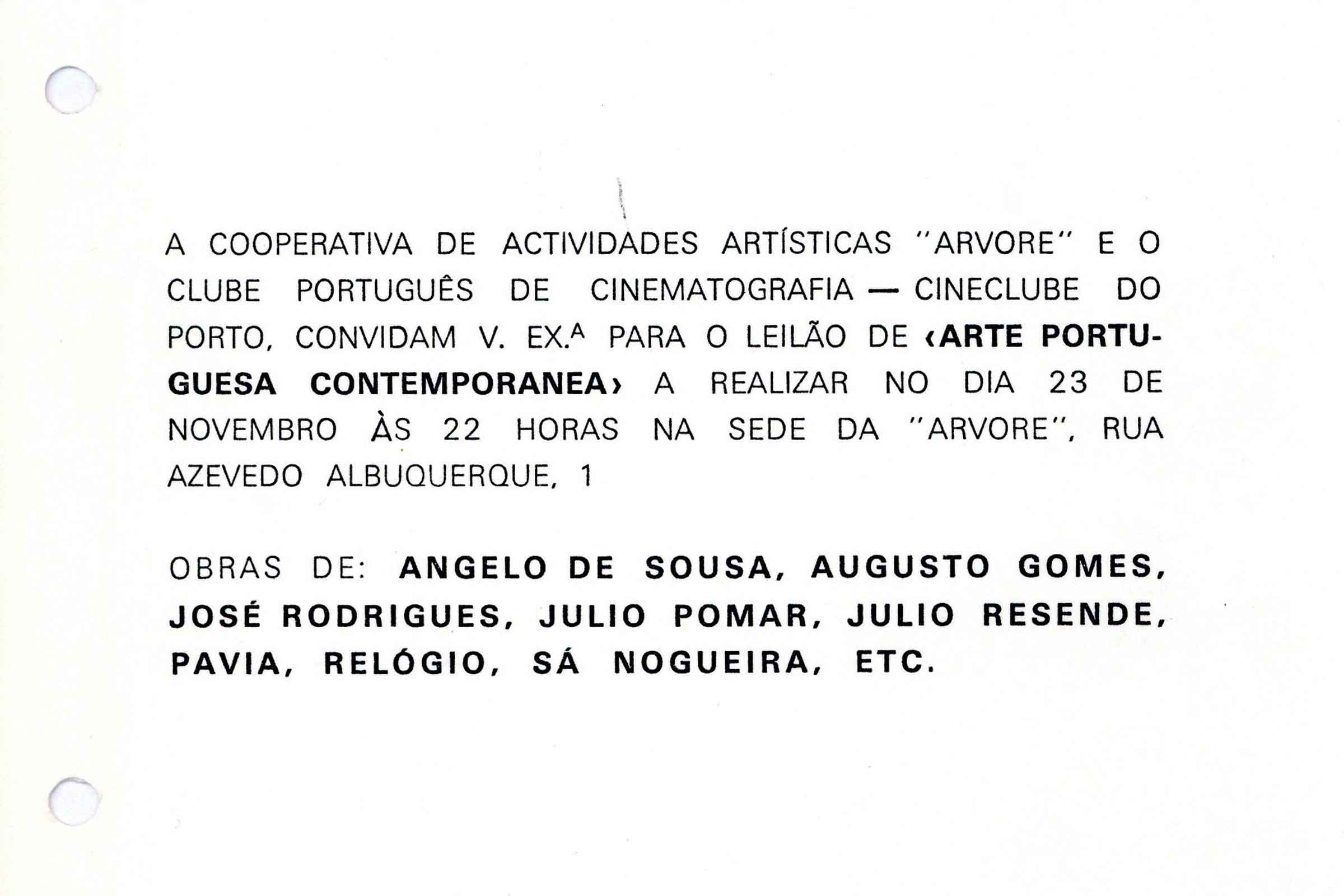
With work sessions at the Cineclube of Oporto headquarters and film screenings at Batalha Cinema, the initiative brings together personalities from the Portuguese cultural world connected to the cinematographic activity with the aim of contributing, through debate and the exchange of ideas, to the “resolution of what has been called the crisis of Portuguese cinema”.
Among filmmakers, cinephiles, journalists and film critics, the speakers were António de Macedo, António-Pedro Vasconcelos, Artur Ramos, David Lopes, Ernesto de Sousa, Fernando Lopes, Gérard Castello-Lopes, Henrique Alves Costa, Jorge Peixinho, José Cardoso Pires, Lauro António, Luís de Pina, Luís Neves Real, Manoel de Oliveira, Manuel de Azevedo, Manuel Machado da Luz, Manuel Pina, Paulo Rocha, Roberto Nobre and Vítor Silva Tavares.
The Foundation sends Carlos Wallenstein as observer.
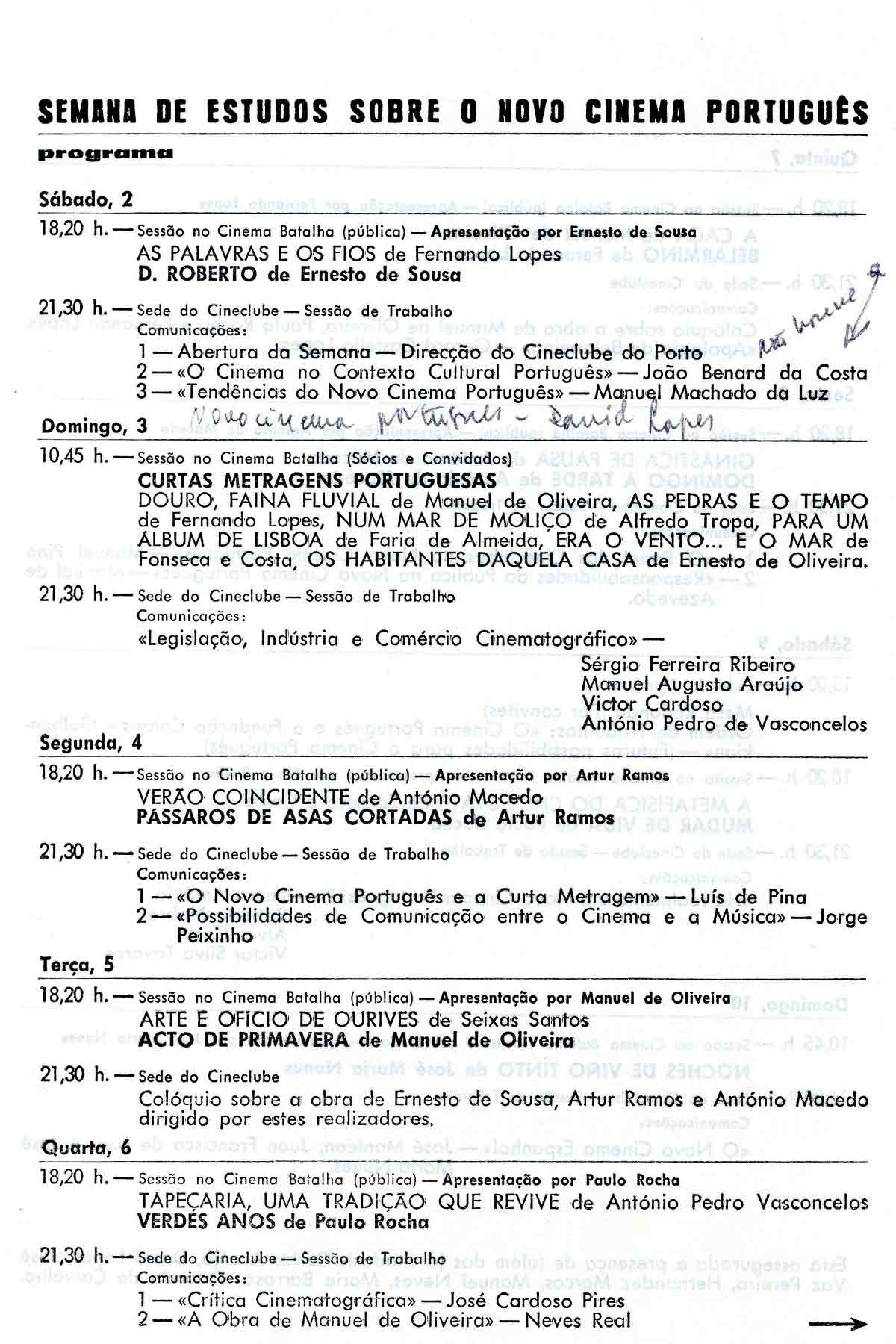
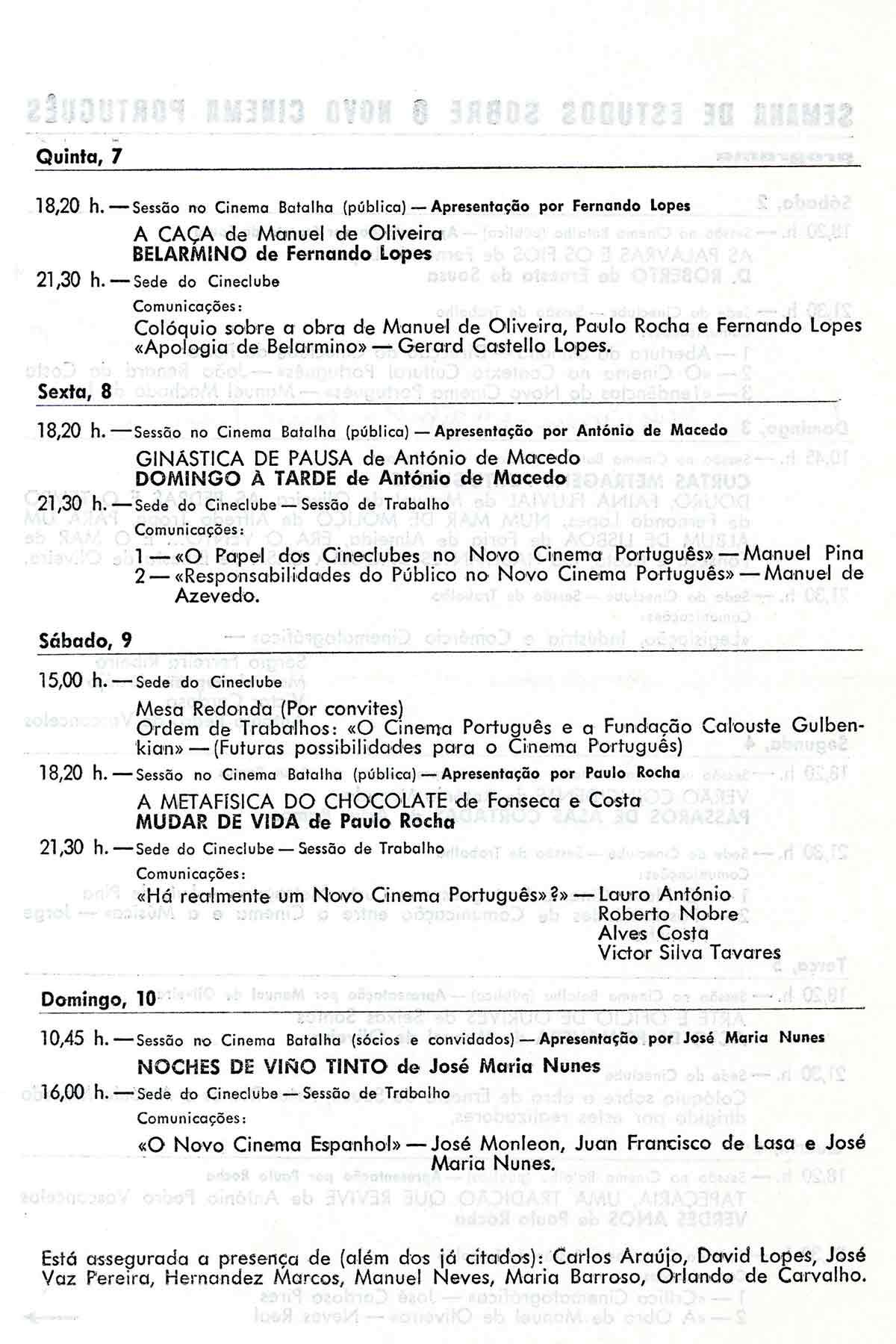
The high light of this week of studies will be the round-table on December 9, in which Ernesto de Sousa, Manoel de Oliveira, Fernando Lopes, Paulo Rocha, António de Macedo, António-Pedro Vasconcelos, Alberto Seixas Santos, Alfredo Tropa, Manuel Costa e Silva, Fernando Matos Silva, José Fonseca e Costa, Manuel Ruas and Gérard Castello-Lopes will participate.
The agenda focuses on the discussion on what the Foundation’s future intervention in the field of cinema should be.
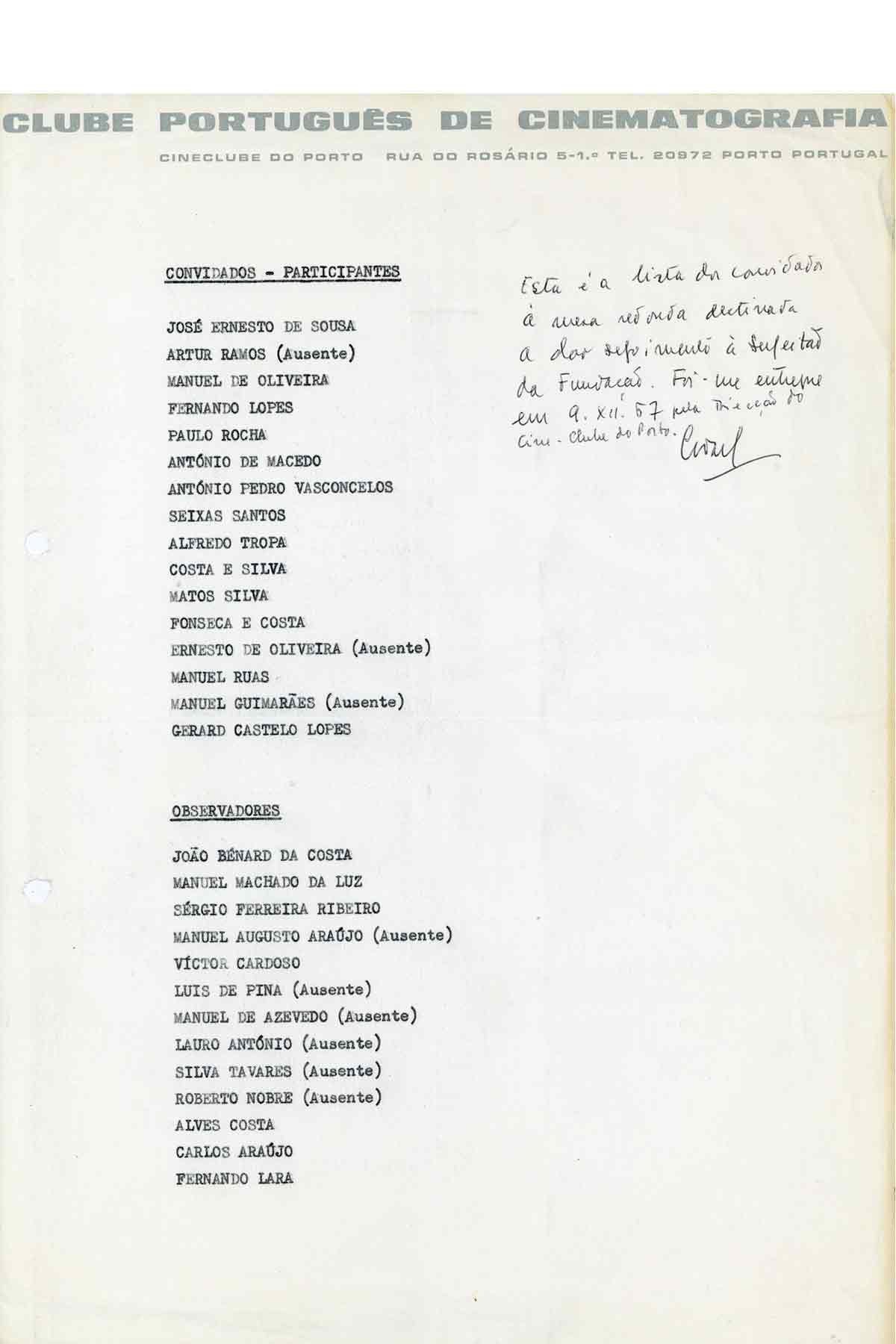
This round-table produced the document – Ofício do Cinema em Portugal – signed by the participants and also by the film directors Artur Ramos and Manuel Faria de Almeida, which expressed, in general terms, how the Foundation intended to materialise its intervention in the support of new Portuguese cinema.
This first document, sent to the Foundation by the sculptor José Grade, from the board of the Cineclube of Oporto, is presented as the “product of a dialogue only now achieved in our country between those most directly interested and responsible (as authors) for the renewal and dignification of Portuguese Cinema”.
It suggests that the “creation of a cinema centre, dependent on the Gulbenkian Foundation, would be the most appropriate overall solution”, with the signatories undertaking to prepare, within three months, a detailed study about film production, distribution and exhibition in Portugal that would justify the Foundation’s support.
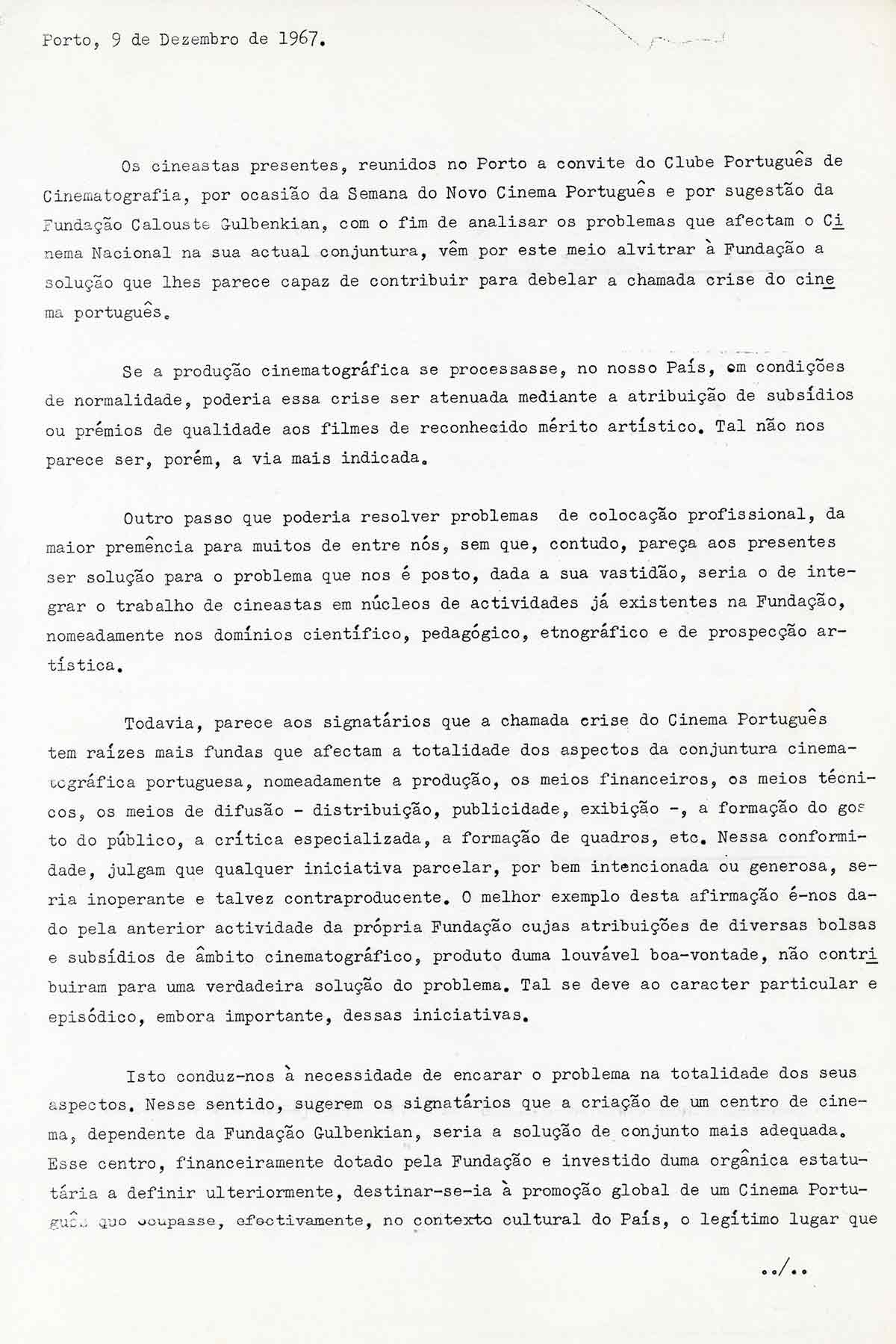
On April 30, 1968, this study was delivered to the Foundation by a delegation composed of film directors Manoel de Oliveira, António de Macedo, Paulo Rocha, Artur Ramos, Alfredo Tropa, Ernesto de Oliveira, and António-Pedro Vasconcelos.
The document presented – O Ofício do Cinema em Portugal. Report addressed to the Calouste Gulbenkian Foundation -, respects the manifesto of the first version of December 9. It discusses the crisis in cinema and insists on the creation of a “Gulbenkian Cinema Centre”, dependent on the Foundation and financially supported by it.
This proposal was refused by José de Azeredo Perdigão, who explained that “the Foundation really wanted to help the cinema, as long as it could do so with an organism outside the Foundation itself”.
As an alternative, he suggests “the possibility of filmmakers organising themselves and creating an organisation with its own legal personality, with which the Calouste Gulbenkian Foundation could deal directly”.
In a letter addressed to the president of the Foundation on June 24, that group of filmmakers, which included Acácio de Almeida, Alberto Seixas Santos, António Escudeiro, Elso Roque, Ernesto de Sousa, Fernando Lopes, Fernando Matos Silva, Gérard Castello-Lopes, João Matos Silva, José Fonseca e Costa, Manuel Costa e Silva, Manuel Faria de Almeida and Manuel Ruas, proposed the creation of a cooperative society of cinema, submitting the project of statutes to the appreciation of the Foundation.
On November 19, the Foundation decided to financially support the new filmmakers’ cooperative for a three-year trial period.
Azeredo Perdigão had recognised that “the young Portuguese film makers had really put their hopes in the Foundation and that they could not be discouraged by it without jeopardising the prestige of the Institution which, like all foundations, has to take risks under penalty of betraying one of the objectives for which it was created: that of playing a pioneering role in sectors which, although they offer no sure guarantees of success, deserve to be helped”.
The creation of the Cinema Section in the Fine Arts Service was also decided, which would be directed by the critic João Bénard da Costa.
On December 5, José de Azeredo Perdigão informed the Centro Português de Cinema – the name chosen in the meantime by the group of film directors for the cooperative society in formation – of the Board of Directors’ decision to financially support it, and the general bases on which that support was based.
An initial sum of 3,200,000$00 is established for funding in the first year of the Centre’s activity, only released as soon as it has legal existence.
However, the process of formalising the Centre dragged on during 1969-1970. The general bases on which the support was based were discussed and fixed in a Modus Vivendi agreed between the Foundation and the Centro Português de Cinema and in force as soon as it was legally recognised.
Despite some attempts by Azeredo Perdigão to speed up the process, it was not until the end of 1970 that the filmmakers’ cooperative was legally recognised.
Meanwhile, determined to move forward with support, in early 1970 the Foundation decided to directly subsidise the directors of the four feature films proposed by the Centro Português de Cinema for the start of their first productions: José Fonseca e Costa’s O recado, Manoel de Oliveira’s O passado e o presente, Alfredo Tropa’s Pedro Só and António-Pedro Vasconcelos’ Perdido por cem…
The sum of 3,200,000$00 is increased by a further 1,235,983$00 to meet the budget of 4,435,983$00 presented by the filmmakers.
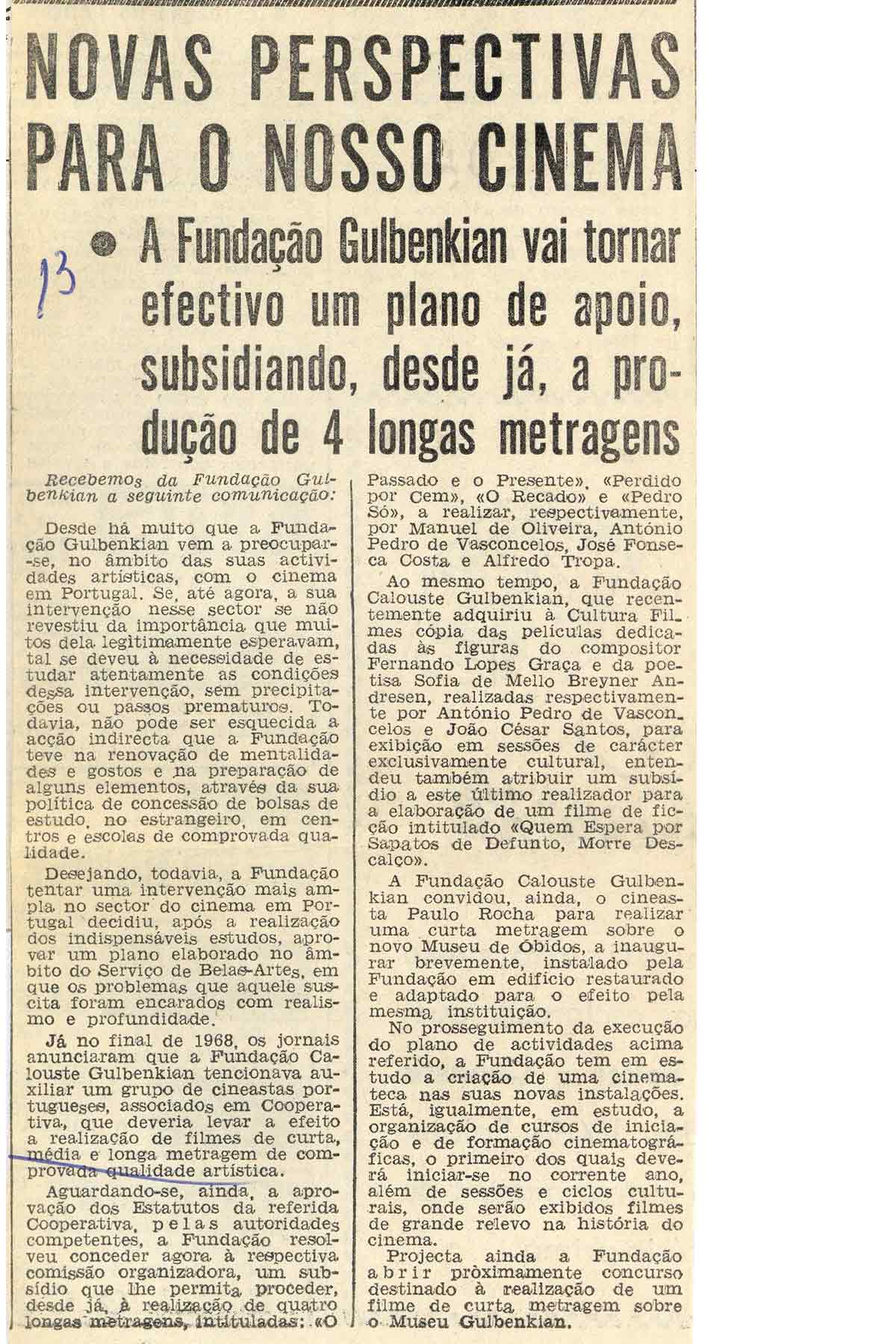
Simultaneously, and apart from the support in the sphere of the Centro Português de Cinema, the Foundation gives subsidies and commissions to other film makers, such as João César Monteiro, António Campos, or Paulo Rocha, to produce the short films, respectively, Quem espera por sapatos de defunto morre descalço (180,000$00), Vilarinho das Furnas (163,886$00) and Pousada das Chagas (265,000$00).
In a short period, between 1969 and 1970, the Foundation supports the new Portuguese cinema with more than 5,000,000$00.
The awaited constitution of the Centro Português de Cinema is finally formalized in Lisbon, on December 17, 1970, by notary deed and only in June 1971 does it acquire legal existence through publication in the Diário do Governo.
Recognised, according to its Statutes, as an “association with cultural aims”, the Centre will have the mission of “developing and honouring Portuguese cinema, especially through the production of films of free artistic creation”. In the first general meeting, an acknowledgement is made to the Calouste Gulbenkian Foundation and its president, who are distinguished as honorary members.
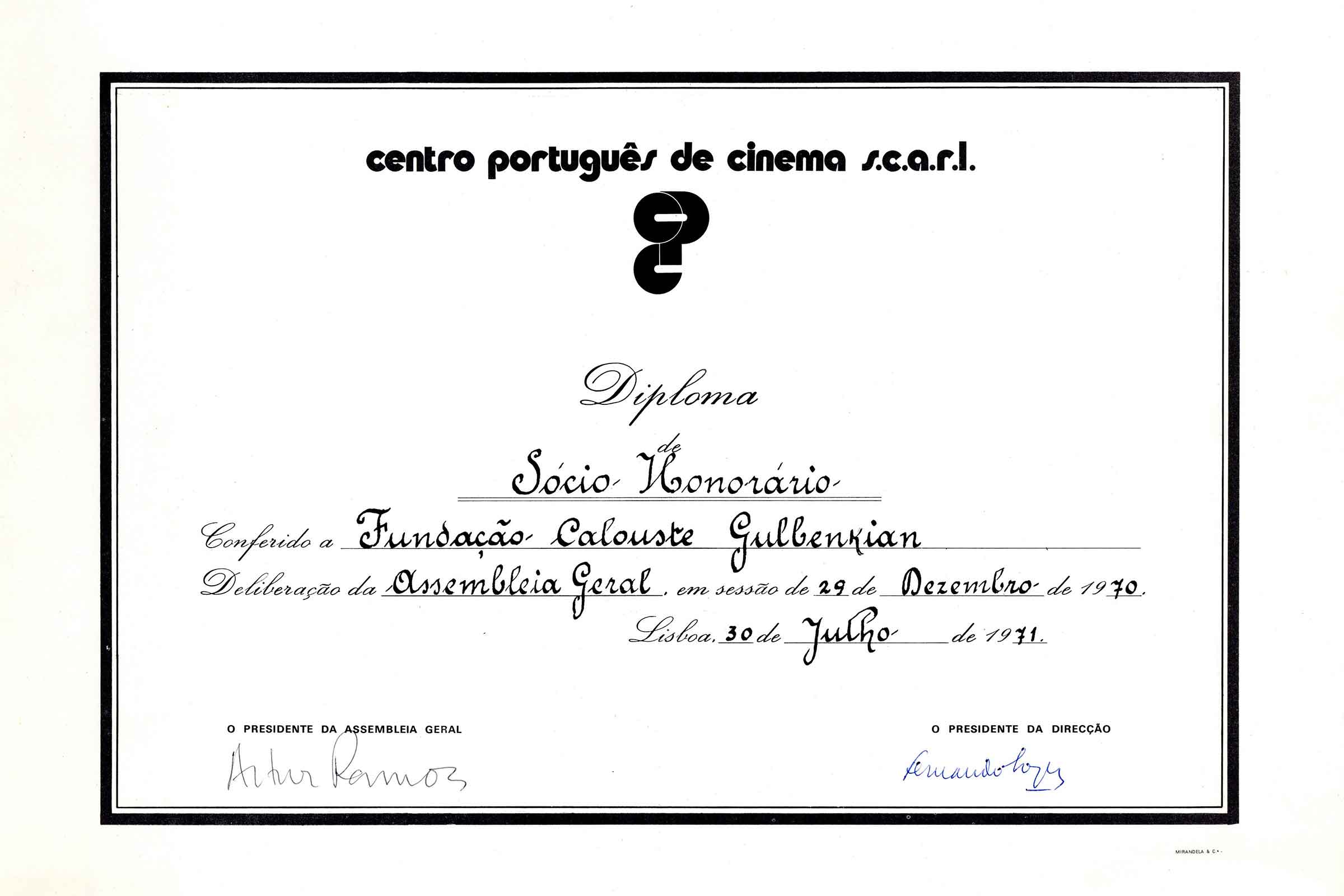
In September of that year, the Modus Vivendi was signed, formalising and regulating relations between the Foundation and the Cooperative. The signatories were José de Azeredo Perdigão, Fernando Lopes, Artur Ramos, Alberto Seixas Santos, José Fonseca e Costa, Gérard Castello-Lopes and António de Macedo.
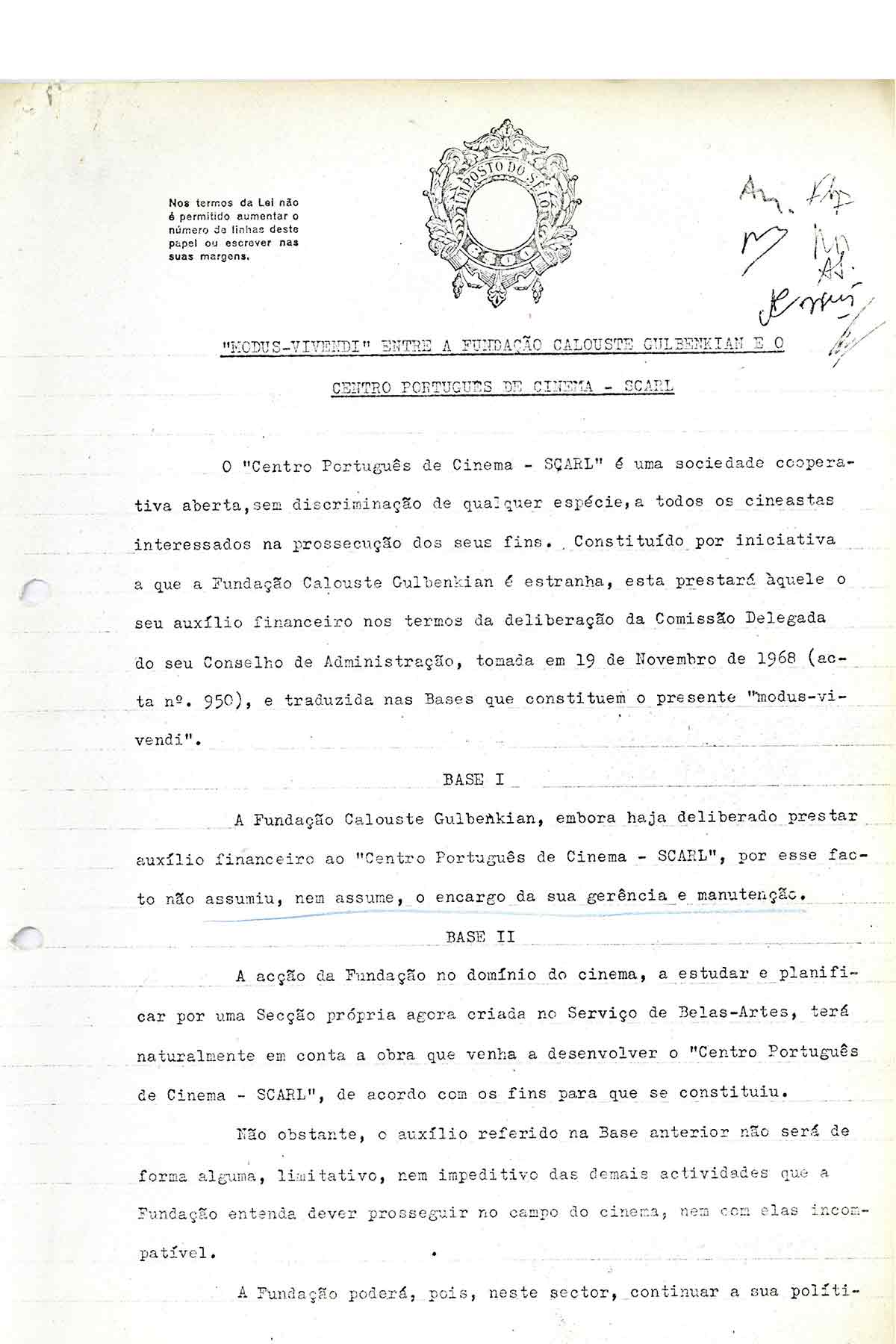
The Modus Vivendi signing ceremony ends with the private screening of José Fonseca e Costa’s O recado in the Grand Auditorium. In the following days, new private sessions will show the remaining films supported by the Foundation before they enter the commercial circuit.
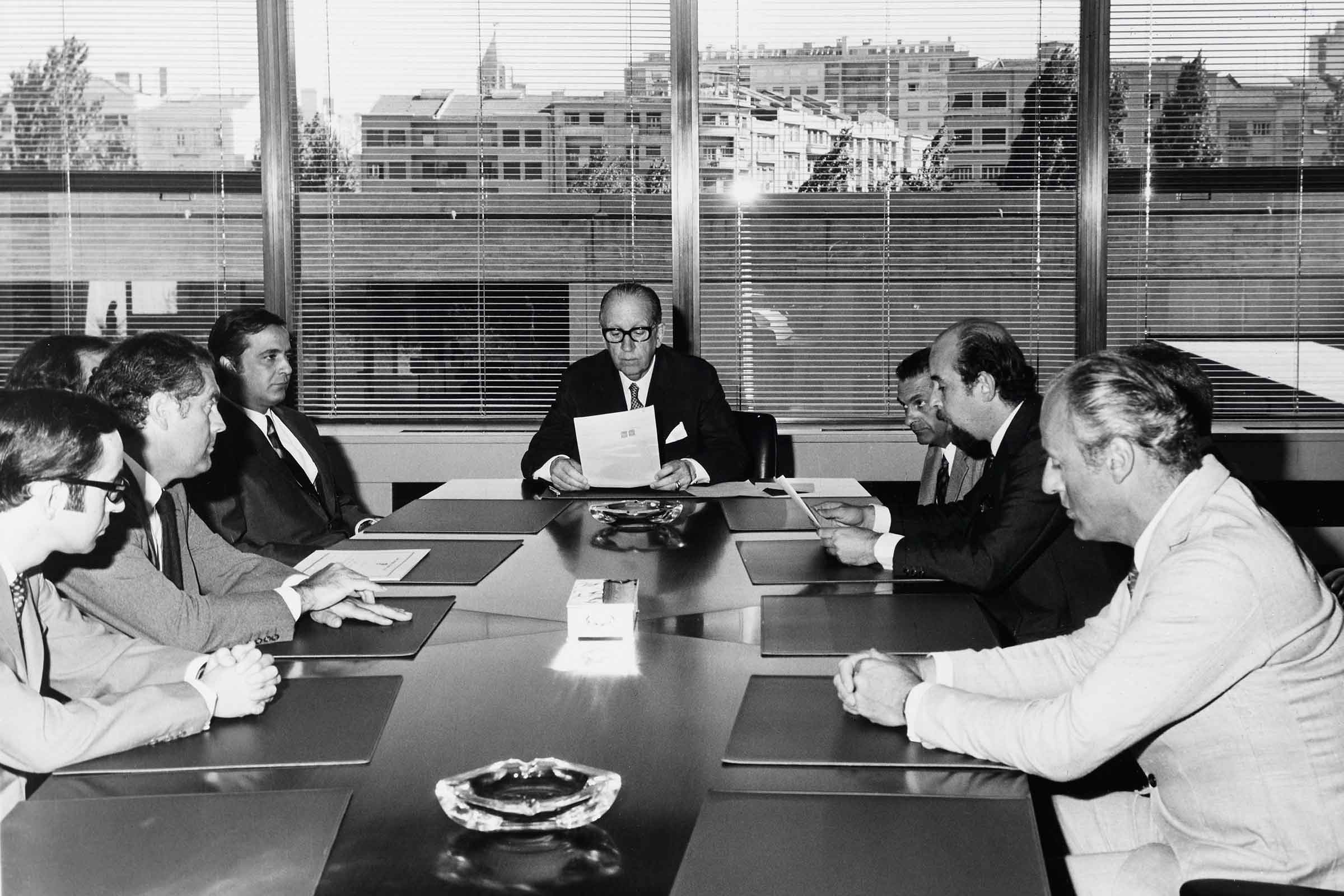
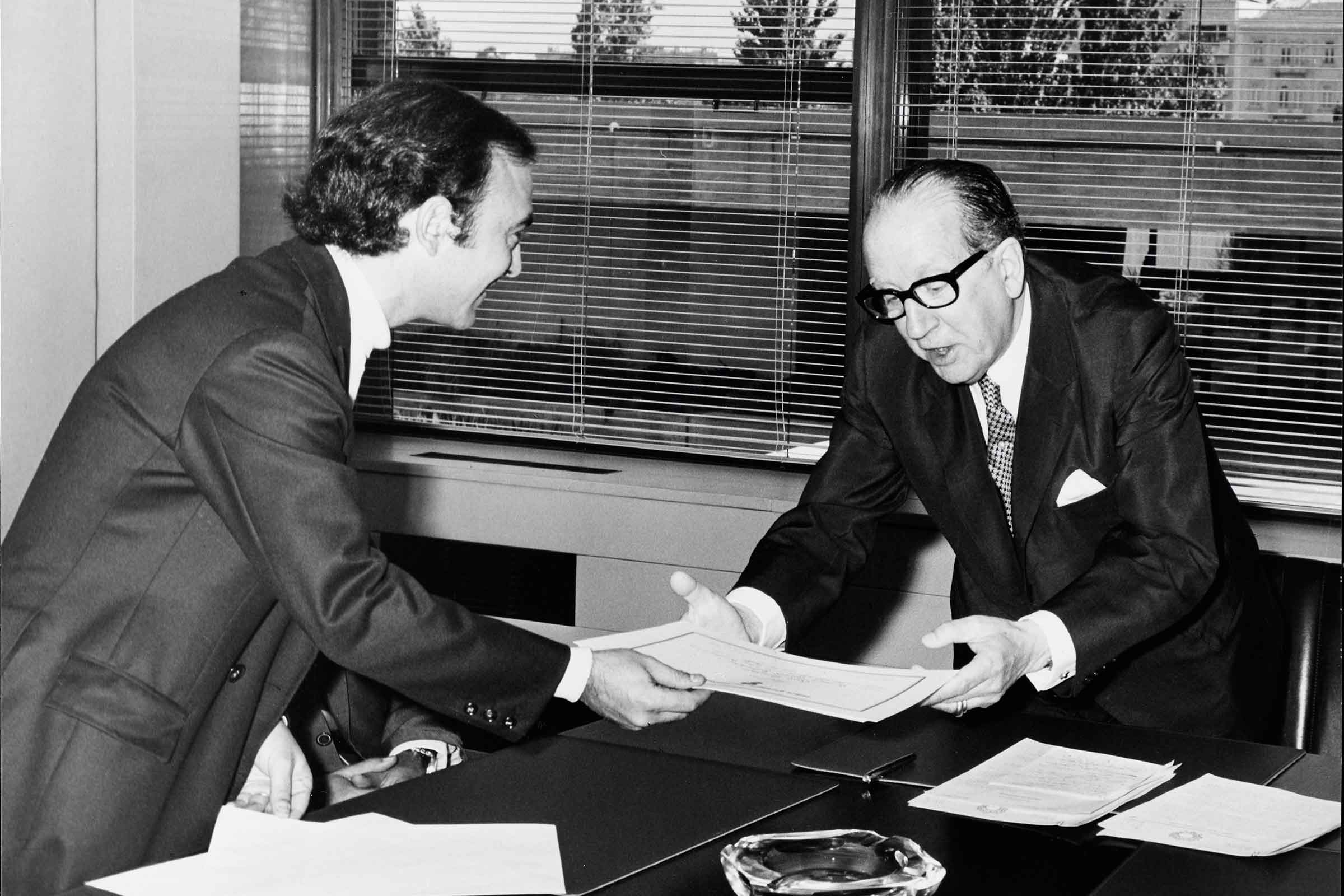
The first public screening of films produced with the support of the Gulbenkian Foundation takes place the following year. Dedicated to the official premiere of Pousada das Chagas by Paulo Rocha, and O passado e o presente by Manoel de Oliveira, the screening takes place in the Grand Auditorium and is attended by the President of the Republic Américo Thomaz, members of the Government and the Diplomatic Corps and many other invited individuals connected with the Portuguese cultural milieu.
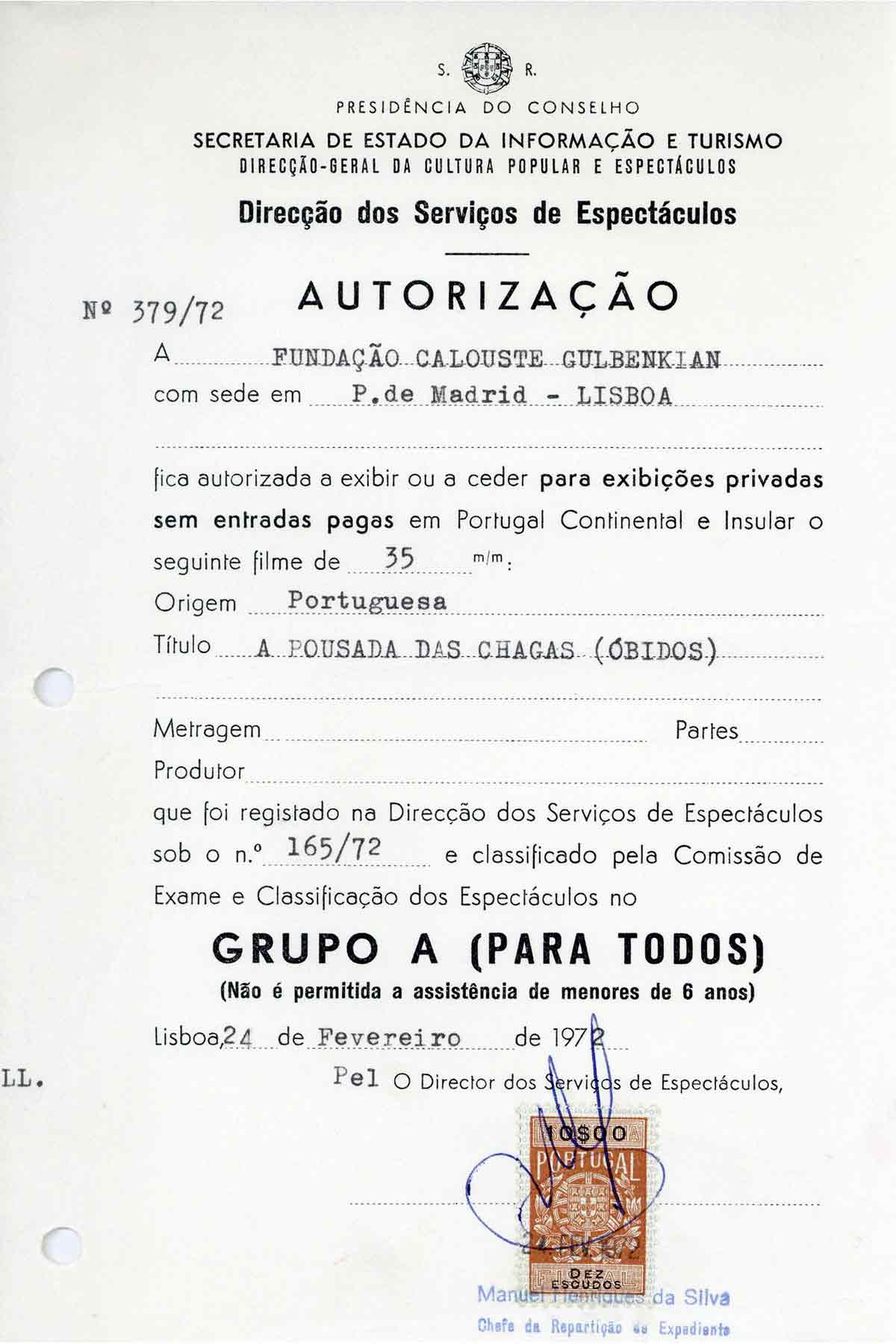
This important session is the culmination of a process initiated by the Week of Studies on the New Portuguese Cinema which, in 1967, launched the debate on film production in Portugal.
From the Archives
Significant moments in the history of Calouste Gulbenkian and the Gulbenkian Foundation in Portugal and around the world.
